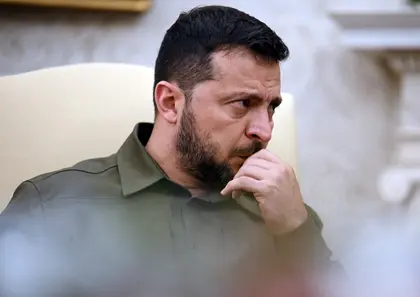Recently, in Lviv, a military registration and enlistment car drove up to a group of young men who were waiting at a bus stop. Enlistment officers jumped out of the vehicle, grabbed one of the men, and began to drag him into the car. He resisted. The officers started beating him and he fell to the ground. Passers-by shouted at the officers, demanding that they leave the man alone. Eventually, he broke away and ran off down the street. The officers did not pursue him.
JOIN US ON TELEGRAM
Follow our coverage of the war on the @Kyivpost_official.
I suspect that similar scenes are occurring in other cities. I know of one that happened in Odesa a couple of months ago. Someone captured the incident on video and it then went viral across the country and sparked controversy over mobilization practices. Frightened men have stopped going out to public places and avoid traveling to other regions of the country because they might be mobilized at road checkpoints during document checks.
Amidst the mobilization tensions, frontline officers complain of a lack of personnel. It is clear to everyone that losses during the counteroffensive have been heavy. There are many killed and wounded, and if they are not replaced, the counteroffensive may stall.
Proposed laws
The Ukrainian parliament is now discussing several bills, the adoption of which could affect mobilization and the country’s defense capability in general.
The main bill, being worked on by more than 100 lawmakers, concerns the introduction of electronic registration of military personnel. After President Volodymyr Zelensky came to power, electronic documentation became very popular in Ukraine, especially among young people. The jewel in the crown is the government application for smartphones called “Diya” (Action). Ukrainians can use it to generate various certificates and documents without visiting state offices.

Which War Is It? Friends and Real Friends, Count the Booms
The proposed bill involves the collection, from existing government databases, personal details of all men eligible for military service from 18 to 60 years old. This super-database will contain not only the names and addresses of persons liable for military service, but all information known about them, including their mobile phone numbers and email addresses.
The key question now – will “Diya” use a smartphone’s GPS to tell military registration and enlistment offices where potential conscripts are currently located?
Government authorities have now increased the size of fines for those who do not live at their official address and have also not informed the authorities about their new address.
Among the bills prepared for discussion in parliament, no. 9566, tabled by a lawmaker Georgiy Mazurashu from the Servant of the People party, is notably humane. It will allow Ukrainians who do not want to go to war to refuse mobilization and instead work at defense enterprises. He believes that such a law will reduce l tension in society.
Such a law could, indeed, reduce the number of men who want to leave the country legally or illegally, but it will most likely not be adopted by parliament since it contradicts the policy of general mobilization.
Illegal exemption certificates
Ukraine’s military medical commissions now operate under close scrutiny. The commissions determine the suitability of a potential conscript for military service based on their health and physical condition. Initial checks showed that some members of these commissions have sold certificates of “unfitness” to those who did not want to go to the front and were ready to pay $4-5,000 for a fictitious diagnosis.
The State Bureau of Investigation is compiling lists of those citizens who could have received illegal exemption certificates. These men will be called back for repeat medical check-ups.
Recently, Ukrainian news outlets published a list of 372 NGOs and volunteer organizations that have been helping men to go abroad in return for money. These organizations produced letters with which men could go to Europe for a few days to carry out work connected with humanitarian assistance and volunteer tasks in support of the AFU. Thousands of men who left with these letters have never returned. Instead, they have asked for temporary protection status from neighboring countries.
Ukrainian lawmaker David Arakhamia has suggested that recently strengthened international cooperation will solve the problem. He stated: “In any country in the world, except Russia, our law enforcement agencies can request the extradition of such people; they can be brought back to Ukraine so that they suffer the appropriate punishment.”
However, representatives of the Austrian, German, and Hungarian governments have already said that they will not extradite to Ukraine those who entered their countries illegally to avoid being called up to fight. There are now officially about 200,000 Ukrainian men of military age in Germany alone, and it is unlikely that the German police will get involved in finding out which of them left Ukraine illegally.
The views expressed are the author’s and not necessarily of Kyiv Post.
You can also highlight the text and press Ctrl + Enter






